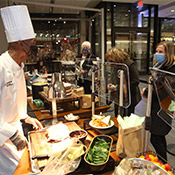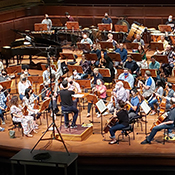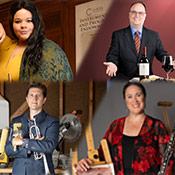
Meet the Music at the Bradley Symphony Center
David Lewellen
PUBLISHED
Tagged Under: Bradley Symphony Center, Meet the Music, MSO Notable
Pre-concert lectures are a staple offering of many orchestras. But aside from the usual lecture with musical examples, the Milwaukee Symphony is making an effort to get more conductors and guest soloists into the lineup, to discuss the music they will be performing in an hour or less, for a more interactive and engaging “Meet the Music” experience.
Although some artists might be concentrating on getting into their mental zone beforehand, others are willing to engage with the audience. Almost as soon as the season is announced, Rebecca Whitney, the MSO’s director of education, will reach out to visiting artists or their agents to find out who is available for a pre-concert appearance.
The guest artists who are interested will often appear in an interview format, with one of the MSO’s regular lecturers leading a conversation about the work to be performed. “The audience always appreciates hearing from a composer or a performer,” said Meaghan Heinrich, an oboist and music educator who frequently gives pre-concert talks. Earlier this season, she interviewed Acting Concertmaster Ilana Setapen before the performance of Bolcom’s Violin Concerto.
Whether or not there is a guest, “I try to take a little of my background and familiarity and share it with the audience,” Heinrich said. “You’re speaking to people with very different backgrounds. You’re trying to make sure that the Mahler scholar isn’t going to roll their eyes and walk away, or that the person who’s never been to a concert before isn’t going to feel overwhelmed.”
She starts preparation by listening to the music, without any reading or research, for “the gut emotional reaction – love, grief, hope, detachment, anxiety. Then, as a musician, I ask myself, how did the composer achieve that result?”
Answers to that question could get very technical, but Heinrich avoids music theory. Instead, she will talk about instrumentation and form. When she goes to a concert with a newbie, the most common questions are why some people enter or leave the stage between pieces, “and I tell them that different pieces from different eras have different instrumentation. People are fascinated.”
“People love to make personal connections about the music,” she said, “and getting to be the person who talks about the music in a relevant and emotional way is really special.”
Resident Conductor Yaniv Dinur, another regular pre-concert presenter, is also talented at making connections. “I concentrate on the music itself, what it is telling us and how it makes us feel,” he said. “I try to avoid extra-musical stories, unless it’s directly relevant.” For instance, Dinur will tell the famous origin story of Beethoven’s Third Symphony (the composer planned to dedicate it to Napoleon but angrily changed his mind when the French leader had himself crowned emperor), but he spends more time talking about the two abrupt chords that begin the first movement. “I compare it to the statues of Rodin, where you see the raw stone around the figure,” he said, since the opening chords contain the notes that are the raw material of the first theme.
The first full season with audiences in the Bradley Symphony Center has meant a major shift in the lecture atmosphere. At the Marcus Center, the talks took place in the atrium, with background noise from the bar and arriving patrons. But they often attracted the interest of casual passers-by, and the atmosphere was more intimate. Presenting in the main auditorium of the Bradley Symphony Center is visually spectacular and quieter but less cozy. Whitney said that the symphony considered holding the talks in the second-floor atrium space but dropped the idea, at least for this season, in part because of concerns about audience distancing and set-up logistics. “But this is the advantage of having our own space,” said Whitney. “We can experiment and discover what works best for our audience.”
Dinur expects there will be more talking from the stage as time goes on, with conductors presenting a short speech about the music before the downbeat. “I think in general it’s a good thing to talk to the audience,” he said, but he prefers to choose his spots carefully so it doesn’t seem like he’s “forcing everyone to hear the pre-concert talk.”
Heinrich makes a point of discussing every piece on the program; Dinur prefers to concentrate on one. Heinrich will bring recorded examples to play; Dinur, an accomplished pianist, would rather perform passages on the piano.
“It’s a little different every week, depending on who the speaker is,” Whitney said. “Different people have different approaches, and that variety allows the expertise and personalities of our different speakers to be expressed. Ultimately, our goal is to foster a greater connection between the audience and the music. It’s why we’re here, and it’s why audiences come back to ‘Meet the Music’ over and over again.”
“Meet the Music” is presented in Allen-Bradley Hall 60 minutes prior to every Classics series performance.



